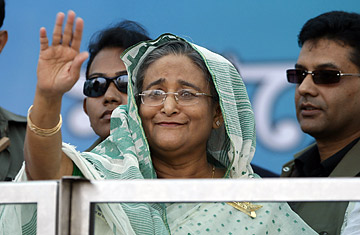
Prime Minister of Bangladesh Sheikh Hasina.
A few months ago, Bangladeshis were worried that their fragile democracy was heading the way of Pakistan, where much of the political power resides with the military or the mullahs. By turning out in massive numbers on Dec. 29 to hand a decisive victory to the Awami League, which campaigned on its secular, reformist credentials, Bangladeshis hope they have steered their nation past those twin shoals.
"We see this poll as a victory of the people," says Adilur Rahman Khan, director of Odhikar, a human rights group based in Dhaka. Bangladesh has spent the last two years under the rule of a military-backed caretaker government that held tightly to its emergency rule. When elections were finally held after months of delays, 85% of eligible voters came to the polls — about 81 million people, more than half of them women and one-quarter of them first-time voters. "After many years, I have voted peacefully and without any fear," says Rokeya Begum, 45, a housewife in the Khilgaon area of Dhaka. (Read TIME's Top 10 news stories of the year.)
The results were overwhelming. The Awami League, led by former prime minister Sheikh Hasina, won a staggering 230 of parliament's 299 seats. The Bangladesh Nationalist Party — led by another former prime minister, Khaleda Zia, who has often faced off against Sheikh Hasin over the years — was reduced to 27. With its allies, the Awami League will have a commanding 262-seat majority.
The landslide reminded Awami League supporters of the party's huge win in the 1970 poll, another pivotal election. Bangladesh was still East Pakistan; when West Pakistan refused to accept the result a brutal military crackdown followed and, eventually, the 1971 war of independence. That isn't the case now. The military has accepted the voters' verdict, which was delivered as 200,000 local and international election observers looked on, although the opposition has raised objections to what it says are voting irregularities.
But the 1971 war for Independence is nevertheless a big issue 37 years later. Bangladeshis are proud of their history, and like to remind visitors that it is not a "Muslim nation." Although almost 85% of its people follow Islam and despite regular intervals of authoritarian rule, Bangladeshis point out that the nation was born out of a popular movement of students and political activists who came together to fight for a secular democracy. (See pictures of Bangladesh and Pakistan's forgotten war)
That's why Khaleda Zia's strategic decision to campaign with an alliance of four Islamist parties, including the Jamaat-i-Islami, which includes some who collaborated with the Pakistani military against the freedom movement, proved to be a huge miscalculation. She repeatedly invoked religion, proclaiming that a vote for the BNP was a vote to "save Islam." She was also silent on the issue of prosecuting war crimes committed during the 1971 struggle. The symbolic low point came this fall, when several Islamist groups pulled down a memorial to the student movement near the airport — they called it "un-Islamic"— and threatened to tear down the Shahid Minar, a series of connected marble pillars that is Bangladesh's equivalent of the Statue of Liberty and the Vietnam Veterans' Memorial. Jamaat contested in 39 parliamentary seats but won only 2, down from 17 in the last polls. "It is amazing," says Sreeradha Datta, a research fellow at the Institute for Defense Studies and Analysis in New Delhi and longtime observer of Bangladesh. "Bangladeshis really voted the secular fabric back into place."
Massive victory, of course, imposes massive responsibility, and expectations are high for Sheikh Hasina. The Awami League has promised not just a trial of suspected 1971 war criminals, but also relief from soaring inflation, expanded agricultural subsidies, equitable economic growth and — just for good measure — a check on jihadi groups. Despite the resounding defeat of Jamaat, militants operating in the border areas between India and Bangladesh are still a significant threat, says Ataur Rahman, chairman of the Bangladesh Political Science Association. Sheikh Hasina will need the full cooperation of the military to control them, but it isn't yet clear how much leverage she will have over the Army and intelligence services, who have used the last two years of emergency rule to put their own people into key positions. "The military is going to be far more entrenched," says Datta.
With such a large mandate, the biggest challenge that the Awami League now faces is hubris. Every time a Bangladeshi party has won an absolute majority, it has compromised that position by suppressing dissent and hoarding power, says Khan of the human rights group Odhikar. "We can only pray that this will be the exception."
